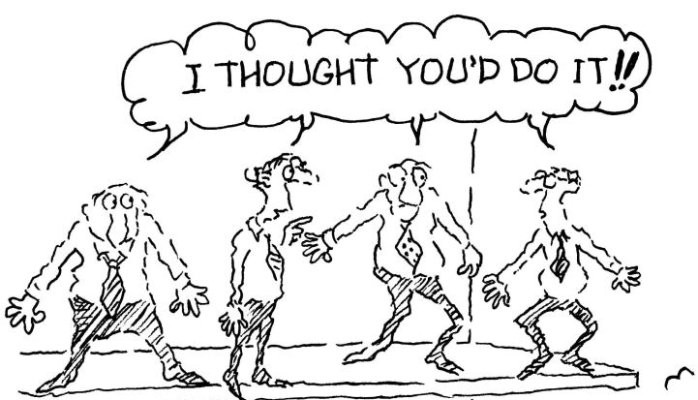As I sat in my office, engrossed in my work, I suddenly became aware of a piercing sound cutting through the usual silence of the day. I glanced out of my window to see thick smoke billowing from my neighbour’s house. Alarmed, I strained to identify the source of the commotion, and it quickly became apparent – the smoke alarm in their home was blaring incessantly.
What happened next was both baffling and eye-opening. Rather than rushing to address the alarm, my neighbours, a group of young people in their twenties, resorted to an unusual method to silence the alarm. They waved their towels frantically at the smoke alarm, as if trying to fan away the offending smoke. It was clear that they had no idea how to properly deactivate the alarm.
The Bystander Effect Unveiled
As minutes ticked by, their futile attempts persisted. Nobody from the neighbourhood came to investigate, offer assistance, or even check if there was a fire raging within the house. The situation highlights a phenomenon known as the bystander effect, a social psychological concept where individuals are less likely to offer help in a crisis when others are present.
Despite the visible signs of distress – smoke billowing from the windows and the smell of something burning – no one took the initiative to ensure the safety of those inside. It was a stark reminder of how people fail to act the more people are present.
Diffusion of Responsibility and Social Influence
Social psychologists Bibb Latané and John Darley introduced the concept of the bystander effect in the wake of the infamous 1964 murder of Kitty Genovese in New York City. Genovese, a 28-year-old woman, tragically lost her life when she was fatally stabbed outside her apartment. What made this incident even more distressing was the disturbing reports that numerous neighbours had witnessed the attack but chose not to intervene or notify the police. When bystanders were asked why they didn’t help the young woman, they said that they didn’t want to get involved in the situation, and they assumed that someone else would help her.
Latané and Darley identified two key factors behind the bystander effect: diffusion of responsibility and social influence. Diffusion of responsibility suggests that the more bystanders there are, the less likely individuals feel personally responsible to take action. Simultaneously, social influence plays a role as people often gauge their actions based on the behaviour of those around them.
When Home Becomes a Danger Zone: Battling Bystander Apathy
The bystander effect is a troubling aspect of human behaviour. In the context of a fire alarm, it suggests that individuals may tend to disregard or delay responding to the alarm, presuming that someone else will step up. In the case of my neighbours, a collective assumption prevailed that either the occupants of the house would address the situation, or a fellow neighbour would step forward to manage it. Fortunately for my neighbours, I overcame the bystander effect.
The video below vividly illustrates the dire consequences of people hesitating to dial the emergency hotline due to a misguided belief that someone else will take responsibility.
In a distressing incident, a fire erupted in Ziandej’s neighbour’s house, eventually spreading to her own home. However, what’s particularly alarming is that during the critical 35 minutes it took for firefighters to arrive, not a single person had dialled the emergency services. Instead, individuals used their smartphones to capture photos and videos. Regrettably, this delay in making the emergency call significantly impeded the firefighters’ response.
This phenomenon of recording events before calling for help is becoming more common, and it’s referred to as the bystander effect. The more people present, the less likely someone is to call for help, as everyone assumes that someone else will do it. This trend is seen not only during fires but also in other emergencies, such as accidents or explosions.
Beyond Backyards: When Smoke in the Bush Goes Unanswered
In a way, this incident mirrors a larger problem that plagues society, especially in rural areas or places surrounded by nature. When people in such areas spot smoke in the bush, they often assume that someone else will report it or take action. This assumption can lead to devastating consequences, especially during bushfire season when rapid response is critical.
Early Warning Systems: A Critical Component in Strengthening Community Resilience
The size and severity of a fire incident, and its subsequent environmental and financial impact, are closely tied to the promptness with which firefighting resources are deployed upon its detection. Timely responses to fires can significantly mitigate their destructive consequences.
Central to bolstering community resilience are localised early warning systems, delivering timely alerts to respond promptly and effectively to fire incidents. This proactive approach enables the seamless execution of evacuation plans, strategic allocation of resources, and fosters a heightened level of situational awareness within the community.
This is precisely where exci’s AI-powered early bushfire detection system becomes invaluable. By leveraging this cutting-edge technology, fires can be detected in their early stages and notify relevant responders immediately. Such a proactive approach can help prevent the spread of wildfires and save lives.
Remarkable AI-Wildfire/Bushfire Detection Achievements by exci
During the 2020/21 devastating Californian fire season, exci’s state-of-the-art technology made a significant impact. It processed over one billion images from more than 1,000 ground-based cameras and analysed 500,000 satellite images to identify smoke and heat across a vast area of 130 million acres in North America. exci’s AI-assisted Fire Management Tool detected 8,672 fires during this period, with an impressive detection rate of 66% within one minute, 95% within five minutes, and nearly 100% within ten minutes, all while maintaining a remarkably low false positive rate.
Advancing Wildfire Detection in Australia with exci
Certified proudly as “Australian Made and Owned,” exci takes charge of an extensive network in Australia encompassing nearly 25 million acres, spanning regions from Victoria to Northern Queensland. Since 2021, the exci system has been identifying and tracking more than 30,000 fires (and counting) within Australia’s borders. Continuous refinements have led to an impressive reduction in the average detection time, from 3 minutes to just one minute. This noteworthy progress underscores the substantial enhancements made in boosting both the system’s efficiency and its accuracy in detecting wildfires.
Breaking the Bystander Effect for Good
In a world where the bystander effect can paralyse us into inaction, whether faced with a blaring smoke alarm or a raging wildfire, it is our responsibility to break free from this psychological trap. The peculiar sight of my neighbours waving towels at a smoke alarm may seem amusing at first glance, but it serves as a stark reminder of the dangers that lurk in our collective inaction.
It is in the face of these dangers that innovative solutions such as exci’s early bushfire detection system, utilising Artificial Intelligence to analyse camera images for the presence of smoke, shine as beacons of hope. Artificial Intelligence does not succumb to the bystander effect. When exci-s AI detects smoke in the camera images, it promptly sounds the alarm and alerts the relevant responders, ensuring swift response.
For those who bear witness to emergencies in the absence of a vigilant AI, let us not falter or wait for others to act. Let us be the catalysts for change, resolute in our commitment to respond swiftly and decisively when the alarm sounds, for the security of our own lives and the lives of others hinges upon our actions.
by Gabrielle Tylor
exci – The Smoke Alarm for the Bush
4 October 2023
Don’t let hazardous events become catastrophic!
Contact our friendly team today for a comprehensive demonstration of exci’s system and discover how it can protect your assets while also protecting your community.
email: info@exci.ai
International Phone: +61 458 594 554
Visit our website at https://www.exci.ai/ to learn more and take the first step towards a safer and more resilient future!

